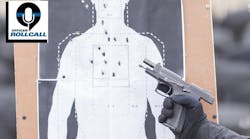Our new Constitution is now established, and has an appearance that promises permanency; but in this world nothing can be said to be certain, except death and taxes. - Benjamin Franklin
While perhaps lacking the certain and universal eventuality of Mr. Franklin’s “death and taxes,” almost all police officers do face another quite-nearly-as-certain life event; no matter how alert, cautious, and devoted to officer safety you are, the likelihood that you are going to be injured in the line of duty at some time and in some way during your career is great. Frequent dealings with the drunk and drugged, the emotionally untethered and dangerously unhinged, and occasionally outright evil segments of society open cops up to frequent scraps and resulting injury. Patrol and traffic officers, road deputies, and state police and highway troopers spend countless hours behind the wheel and even standing on the road while multi-ton missiles whiz by. Almost no one gets by without the occasional dings and dents, bumps and bruises.
Unfortunately, for many of us the “dings and dents, bumps and bruises” will be the least of our wounds. At some point the injury suffered will be much more serious, and how effectively we respond both physically and emotionally might mean all the difference between the injury being a painful but temporary speed bump or a debilitating trauma that permanently impacts our personal and professional efficacy.
We do understand there are many physical injuries that are physically and mentally devastating and forever alter lives and stop careers in their tracks. They are tragic and devastating. What we want to do, however, is address the lesser but still serious hurts that may not cause such certain long-term physical or emotional damage, and that can be overcome so you can carry on without suffering lingering effects that compromise your future.
The physical damage caused by injury is pretty straightforward; if, while wrestling a combative suspect into custody, you suddenly feel an explosive pain as your knee bends in a way you instinctively know it’s not supposed to, you realize something’s wrong. Later, a doctor explains (in their typically and oddly dispassionate way) that you anterior cruciate ligament is torn and what it means and what you have to look forward to, and you walk (hobble) away knowing exactly what happened. You look back and remember the eye-popping pain, and what you were doing when it happened, and probably understand what went wrong and what you now need to do to get better. That’s all well and good. Our bodies have limits and sometimes we exceed them, especially when we’ve signed on as cops, and then the piper comes calling to be paid.
The bigger problem – the problem that may well persist through treatment, rehab, light duty, and even once you’re cleared to return to full duty – is much more psychological than physical. Suffering a physical injury can lead to feelings of rage, disbelief, fear, inadequacy, or depression. To discover we’re vulnerable and at risk, especially if we previously enjoyed high status and confidence in our physical abilities due to officer safety skills, may come as a shock. Once restored to full duty, officers can still suffer the emotional effects of an on-duty injury, and these can hinder effectiveness (at best) or endanger the officer (at worst). Effectively managing the psychological impact of an on-duty injury can be essential to your career survival.
Although there is no guarantee how you will react to a serious injury – and we’re talking now about more than the simple “dings and dents, bumps and bruises” – that it will have physical, mental, and emotional ramifications is certain. Developing a proper mindset before you find yourself hurt is a powerful way to mitigate potential problems during recovery and after a return to full duty.
An ounce of prevention…
Taking seriously all you can do to avoid getting hurt in the first should be second nature. Officer safety skills are taught early and often, and stressed over and over again for a reason, but we would be remiss to not add our own emphasis. While even the most safety conscious officers aren’t immune to their best efforts someday falling short, the bigger risk lies in allowing complacency to take hold. Every tense, dangerous, or high-risk encounter you survive intact is both a blessing and a curse – a blessing in coming out unscathed and the lessons you take away for next time, but also a curse if one of those lessons is, even subconsciously, that you cannot or will not get hurt next time, or that, “I’m really good at this! Maybe I AM a little special!”
But beyond your officer safety skills, how well have you kept your physical self in shape? You may have been in the best shape of your life the day you graduated from the academy, right before your FTO schooled you in the hunger-fighting wonders of hastily consumed fat-drenched calories. Your twenty-something year old muscles were limber, strong, and instantly available for action before you’d folded yourself into a squad car a few thousand times while wearing 20+ pounds of gear. And you were, frankly, young. How have you held up and, to the extent you can control, how have your efforts been to stay in shape?
Find or develop a regular workout regimen, commit to staying (or betting back) in shape, and consider maintaining your health and fitness an essential job and life function. Being in good physical condition is no guarantee you won’t be injured but being out of shape greatly increases the chances you will be, and makes recovery more difficult.
Expect to someday be injured
I suppose this may be a little controversial or even cause a little anger – to expect to get hurt seems fatalistic or possibly self-fulfilling – but I think it’s only being realistic; law enforcement is a risky business. Do everything you possibly can to avoid being hurt on every call, stop, and field contact, but don’t wear blinders to the risks, your own limitations, or that sometimes terrible luck overwhelms the best practices.
Studies of collegiate and other elite athletes have found high instances of anger, disbelief, fear, anxiety, and depression following injury. Often these are top tier athletes who, due to their youth, strength, and dominance in their sports, have never really experienced serious injury. Reaching the elite milieu beyond high school is a great equalizer and, to stay competitive with stronger and more dominant athletes, they have to push their bodies farther than ever and risk more. When their bodies fail shock and outrage may follow.
Knowing eventual injury is not only possible but, over a long time, likely insulates against the shock, outrage, and depression you might experience as a cop.
Take time to recover
You may be tempted to hurry back to work (or your agency may be tempted to pressure you to return ASAP) – to “get back on the horse that threw you” – but take ample time for recovery. Rushing back only puts you at greater risk and does no one any favors in the long run. Follow the directions of any physicians treating you religiously and don’t be afraid to seek second opinions if you think the best interests of your health and recovery are not being honored.
And if you believe your agency is pushing your return too fast, you may want to consider legal representation.
Do what you physical therapist(s) tell you to do
You are not going to want to. Physical therapy isn’t fun. Physical therapists are highly-educated, extremely dedicated professionals whose generally friendly and upbeat personalities mask their cold willingness to use modern variations of 14th Century torture to reach their goals.
Physical therapy sucks but it works. Do what your therapist says. Really, you don’t want to make her angry. She knows things you never want to experience.
Be aware of the fears and anxieties being hurt might trigger
It is not uncommon an injury will trigger anxiety, not only post-incident and during recovery but also once you return to full-duty. Questioning how fully recovered you are, wondering whether your body will respond adequately the next time, or experiencing fear of being hurt again are all common emotions that may arise consciously or unconsciously. These are normal and should be anticipated and acknowledged! Being aware these thoughts are coming gives you power over them. Denying them virtually guarantees they will take you by surprise at the worst possible time.
Once back, be aware of doubts, worry, fear, or any desire to hold back or avoid confrontation before you get that next hot call. Use that awareness to develop strategies to overcome them. Fear is an emotion to be used.
Get back to work as soon as you are really able
Take time to recover, sure, but get back in the saddle as soon as possible. Even if that means coming back on light duty you will stay connected to work and avoid the social isolation and professional distance that can lead to depression. More importantly, once you are physically recovered an important component of psychological recovery will necessarily include returning to work and regaining confidence in your ability to fully function.
Keep your sense of humor
Being able to laugh at absurdities of this job is key to surviving it. Being able to laugh at yourself and the circumstances you cannot take back that lead to unfortunate predicaments softens anger, relieves frustration, and wards off depression. This is not to suggest taking injuries lightly, only to put them in perspective.
As always, BE SAFE! Take every precaution, and it’s our hope you never suffer a serious injury. But if you do, take seriously all the precautions to prevent your physical injury from becoming a psychological wound.


